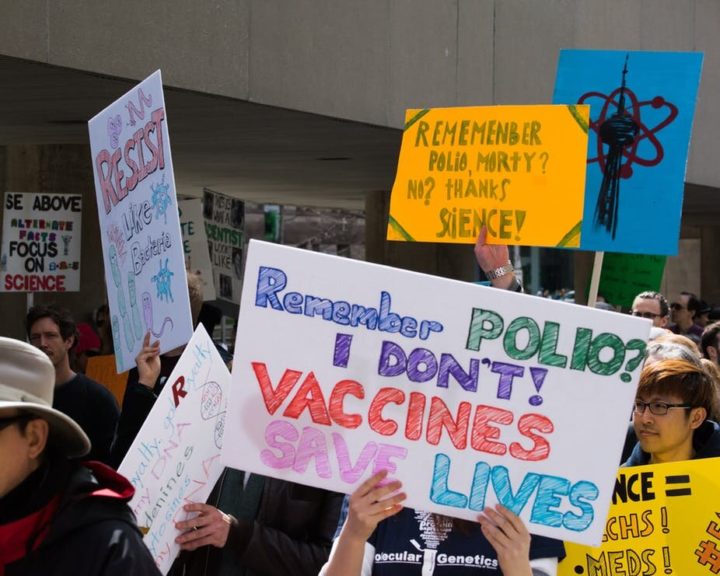By Jhon Sánchez
The anti-vaccine movement has undermined the efforts made in different parts of the world to eradicate polio, measles, and other viral diseases. In 2019, Pakistan reported a resurgence of almost eradicated polio after political leaders campaigned against the vaccine. Two million mothers refused to vaccinate her children, convinced that the program was an orchestrated plan to sterilized Muslims.
In the United States, in 2017, seventy-five Somalis were infected with measles during an outbreak of the disease in Minnesota. The Somalis parents have refused the vaccine after listening to Andrew Wakefield, a former medical doctor stripped of his British license to practice.[1] Wakefield preaches that the vaccine causes autism, and his research paper has been retracted for controversial data.[2] In response to the measures taken to fix the problem, Glen Beck, the TV-radio commentator, “called the outbreak a “hoax.””
Sherri Tenpenny, a osteopathic physician, claimed during her anti-vaccine propaganda that “infants rarely die from measles,[3]” even though more 140k people died from measles in 2018, for example.
The public is now scared. A 2014 study of the University of Chicago shows that 20% of Americans believe that Doctors vaccinate children “even though they know such vaccines to be dangerous” and they do it for money.[4]. But the reality is another. Doctors are giving up offering immunizations because vaccines are not cost-efficient. They are expensive, and the dollars go to the manufacturers’ pockets, not to the solo practitioners’.
Does this sound familiar? Many falsehoods around Covid-19 resemble the above: ‘Bill Gates created the virus to eliminate 30% of the population’ or ‘the virus doesn’t kill people,’ or ‘Doctors are putting people on a ventilator to make money.’ And the problem is the fear that those theories inspire in the general population, undermining a coordinated effort to defeat the virus.
As of today, 40% of the Americans are unwilling to inoculate themselves against Covid-19. This percentage would jeopardize the possibility of eradicating the virus from the country. Source: August 31, 2020, Washington Post.
One of those people is Micah Conrad, a LA resident, and young film director who edited some videos for the Health Freedom Submit. Micah wasn’t anti-vaxx himself but now believes that the way to combat the virus is with diet, sun, and exercise. Peter Jamison made a portrait of Micah Conrad for the Washington Post. Micah grew up in the countryside, homeschooled, and attended a nondenominational Christian church. His mother provided him with healthy food around strong family ties. It would be fair to say that Micah lived a childhood free of disease threats and with access to medical care. His opinion fits what research called motivated reasoning: “we tend to give more weight to studies, news articles, and any other form of information that confirms our pre-existing beliefs and values, and find ways to reject things that don’t line up with what we feel to be true…”[5] People like Micah more likely would reject to be inoculated.
In this scenario, President Trump promises a vaccine for this year, in a convenient time to boost his chances to be reelected. “ ‘If the public doesn’t trust the authorization process and sees it as politically influenced, what is vaccine uptake going to be?’ asked John Moore, a virologist at Weill Cornell Medicine.”
The defense against the Anti-vaxx activists has always been the body of legislation and high standards for medical trials before releasing a vaccine. For example, we have the Bio Logistics Control Act to prevent contamination of the vaccines, The National Vaccine Injury Act that created a compensation for any damage, and the Vaccine Adverse Reporting System. But flexing the rules would justify anti-vaxx’s claims in the view of many who are now suspicious of the institutions.
The question is how the government would now convince people like Micah Conrad that the vaccine is a matter of public health. When we promote public health, we talk about prevention: we try to protect those ones who are more vulnerable, more exposed, and with a higher risk of dying. “Fighting disease is a public-health crusade; leading a healthier life is, very often, a private one.[6]” I don’t know whether Micah Conrad and 40% of Americans who may reject a COVID vaccination would consider the impact on public health. I don’t know if they would consider the benefits of polio, smallpox, and measles vaccines have brought around the globe. As Anna Merlan says in her book Republic of Lies, one of the problems that a movement like the Antivaxx causes is promoting the lack of empathy. “Furthermore, by creating a legible moral map of the universe, conspiracism can lead to a particular lack of empathy, a route so simple and straight and perilously narrow it points, at times, directly to hatred.[7]”
And hatred is, probably, the real infection we need to fight.
Jhon Sánchez: A Colombian born, Mr. Sánchez, arrived in NYC seeking political asylum where he is now a lawyer. His short stories are available in Midway Journal, The Meadow, Newfound, Fiction on the Web, among others. In February, Teleport published his short story ‘Handy.’ The DeDramafi, was published on The Write Launch, and Storylandia will reprint it in issue 36. He was awarded the Horned Dorset Colony for 2018 and the Byrdcliffe Artist Residence Program for 2019. In 2021, New Lit Salon Press will publish his collection Enjoy Pleasurable Death and Other Stories that Will Kill You. For updates, please visit the Facebook page @WriterJhon
[1] Merlan, Anna. Republic of Lies (p.125). Henry Holt and Co.. Kindle Edition.
[2] Id.
[3] Id at 130.
[4] Id. at 123.
[5] Id. at 24-25.
[6] In ‘These Four Walls,” Jill Lepore argues that now architecture tries to prevent disease. In the quote cited above, Jill Lepore wonders whether leading to good health is, still, a matter of the private sphere. Since the article is about architecture, I thought the quote is valid in this context.
[7] Merlan, Anna. Republic of Lies (p. 244). Henry Holt and Co.. Kindle Edition.






